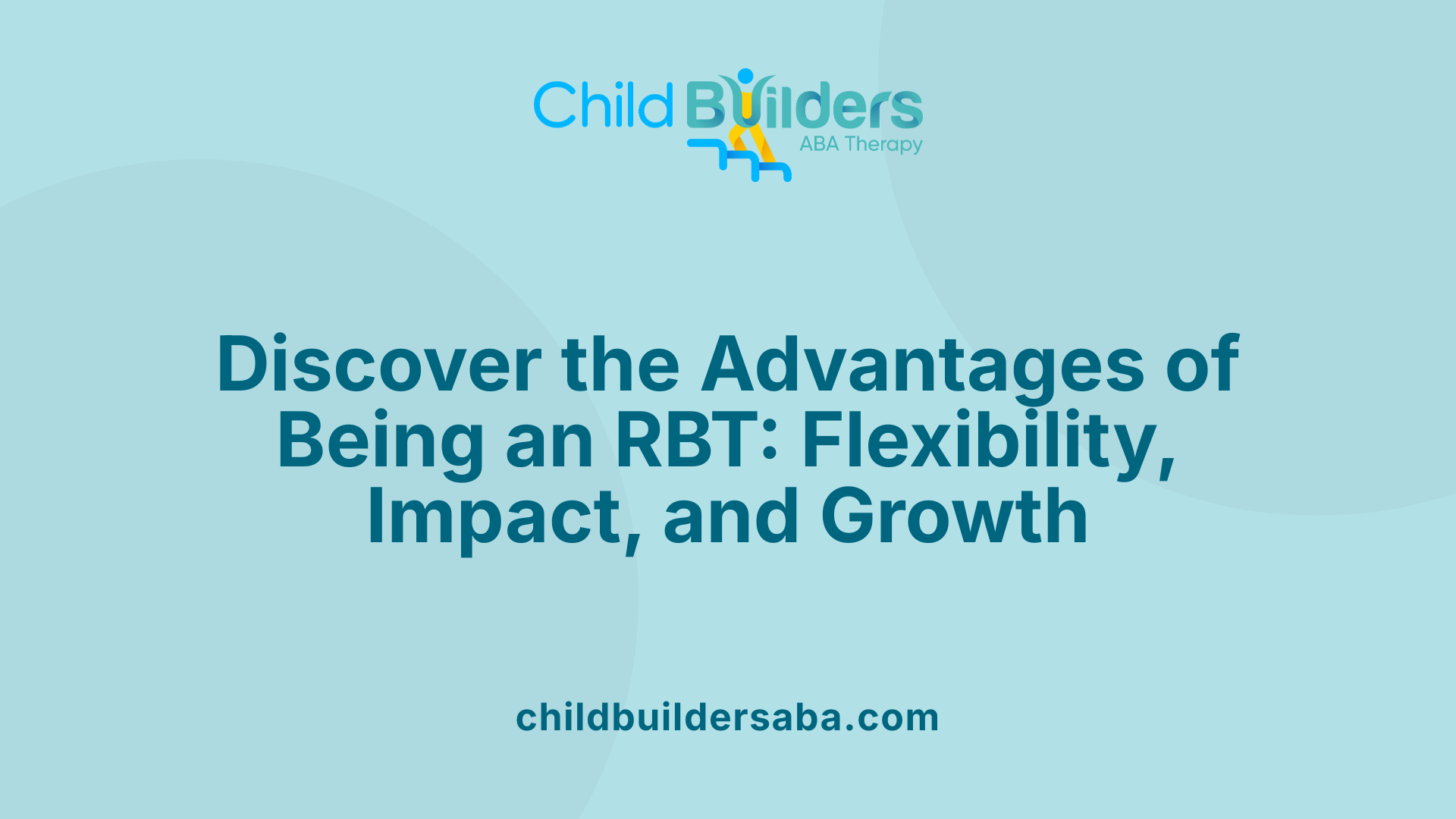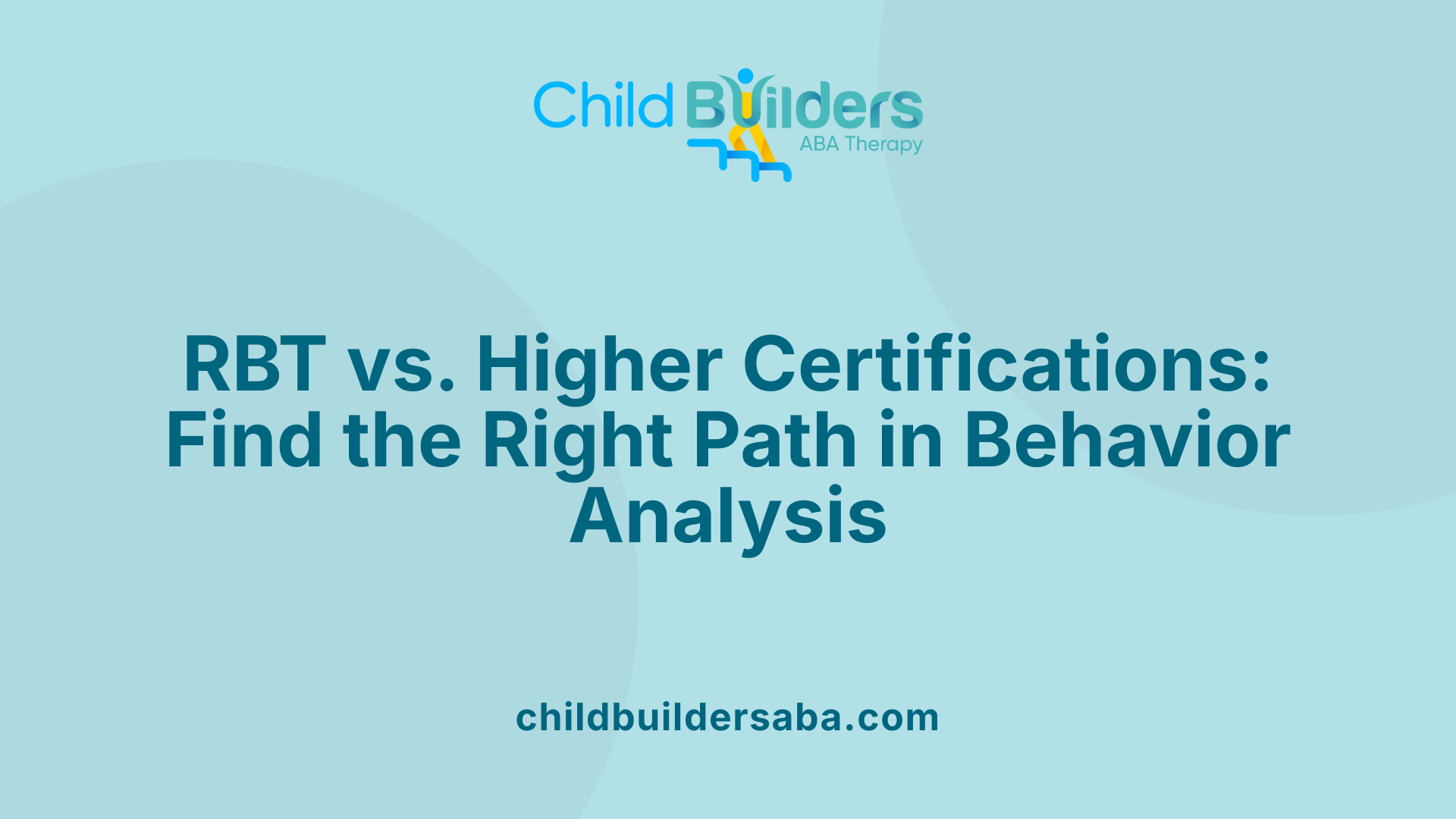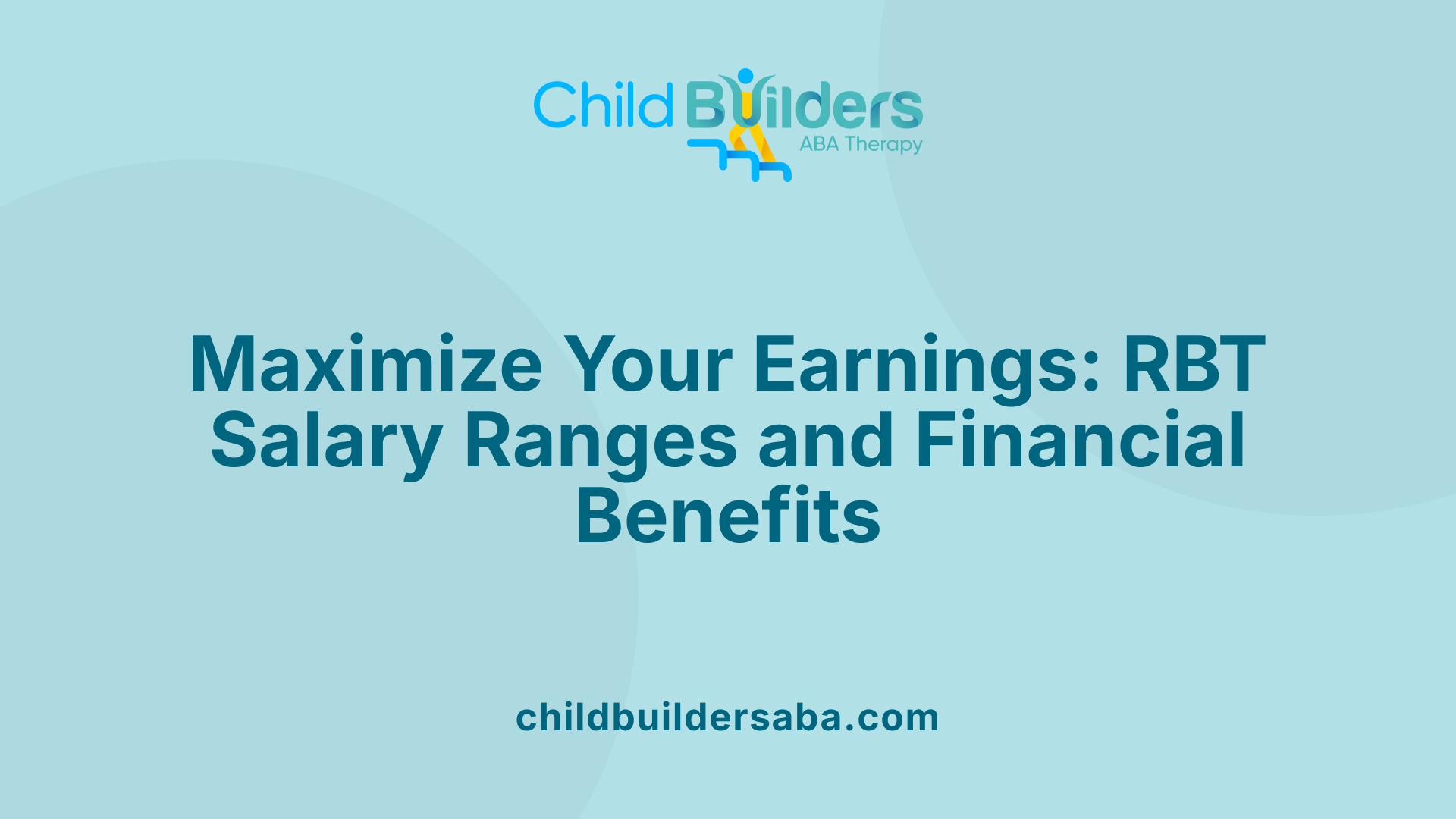Is RBT Certification Worth It?

Understanding RBT Certification and Its Significance
In recent years, the demand for qualified behavioral health professionals has surged, making the Registered Behavior Technician (RBT) credential increasingly relevant. This article delves into what RBT certification entails, its benefits, career prospects, and whether it stands as a worthwhile investment for those interested in a career within applied behavior analysis (ABA). By examining comprehensive data—from training requirements to salary potential—we aim to provide a nuanced view of the value attached to becoming an RBT.
What Does the Process of Becoming an RBT Involve?
Eligibility Requirements
To start the journey of becoming a Registered Behavior Technician (RBT), individuals must meet specific eligibility criteria. Applicants need to be at least 18 years old and possess a high school diploma or its equivalent. Additionally, a clean background check is essential to qualify for certification. These prerequisites ensure that candidates are prepared to undertake rigorous training and uphold the professional standards expected in ABA services.
Training Programs
The next step involves completing a comprehensive 40-hour training program approved by the Behavior Analyst Certification Board (BACB). This training covers fundamental concepts of Applied Behavior Analysis (ABA), including ethical considerations, measurement techniques, and intervention strategies. The coursework prepares candidates to effectively support behavior intervention plans and to work under supervision.
Competency Assessment
After successfully completing the training, candidates must demonstrate their skills through a competency assessment. This assessment is conducted by a Board Certified Behavior Analyst (BCBA) or a qualified professional. During this evaluation, the candidate showcases their ability to implement intervention strategies, collect data accurately, and adhere to ethical guidelines. Passing this competency assessment is essential before moving forward.
Certification Exam
The final step to earning RBT certification is passing a multiple-choice exam administered at Pearson VUE testing centers. The exam covers six critical areas: measurement, assessment, skill acquisition, behavior reduction, documentation and reporting, and professional conduct. The exam typically costs around $45, following a $50 application fee, and lasts approximately 90 minutes. Successfully passing this exam certifies that the candidate has met the BACB’s standards for professional competence.
Ongoing Certification Maintenance
Maintaining RBT credentials requires ongoing professional development. Certified RBTs must complete periodic supervision sessions and ongoing education to stay current with best practices and ethical standards. Renewing certification involves submitting annual renewal paperwork, passing a renewal competency assessment, and paying renewal fees. These requirements help ensure that RBTs continue to provide high-quality services and uphold the integrity of the field.
| Step | Description | Typical Timeline & Costs |
|---|---|---|
| Eligibility | Meet age, education, and background check | N/A |
| Training | Complete 40-hour approved program | 1-2 weeks, around $100-$200 |
| Competency | Demonstrate skills via assessment | Conducted immediately after training |
| Exam | Pass the certification test | Scheduling varies, exam fee ~$45 |
| Maintenance | Ongoing education and supervision | Annually, ongoing costs and time investment |
Overall, becoming an RBT involves a series of structured steps designed to ensure practitioners are well-trained, competent, and equipped to support individuals with autism spectrum disorder effectively.
Benefits and Advantages of RBT Certification

What are the benefits and advantages of obtaining an RBT certification?
Earning a Registered Behavior Technician (RBT) certification opens doors to a variety of professional opportunities and growth within the field of applied behavior analysis (ABA). One of the most significant benefits is the recognition it affords in the job market. RBTs are credentialed professionals qualified to deliver ABA therapy, which is increasingly sought after in schools, clinics, homes, and community settings.
The certification acts as a solid foundation for career advancement. Many RBTs go on to pursue higher credentials such as the Board Certified Behavior Analyst (BCBA) or the Board Certified Assistant Behavior Analyst (BCaBA), which can lead to higher salaries and more specialized roles. This pathway not only boosts earning potential but also enhances professional credibility and skills.
Flexibility in work environments is another advantage. RBTs can choose to work in varied settings, including educational institutions, healthcare facilities, or even in private homes. The job's flexible hours accommodate different schedules, making it suitable for those seeking part-time work or flexibility around personal commitments.
The role allows professionals to make a meaningful difference in the lives of individuals with autism spectrum disorder and other developmental conditions. Implementing evidence-based interventions, teaching new skills, and reducing problematic behaviors can significantly enhance clients' quality of life.
Furthermore, the demand for RBTs is rising due to the increasing prevalence of autism diagnoses, providing job stability and security. The profession is known for its rewarding nature, offering opportunities to help others accomplish meaningful developmental milestones.
| Aspect | Detail | Additional Insights |
|---|---|---|
| Credential | RBT certification | Recognized by the Behavior Analyst Certification Board (BACB), demonstrating competence in ABA principles |
| Employment prospects | Growing job openings | Across schools, clinics, private practices, and home settings |
| Career growth | Pathway to BCBA/BCaBA | Higher roles with increased salaries and responsibilities |
| Work environment | Diverse settings | Offers flexibility and varied experiences |
| Impact | Helping individuals with autism | Implementation of behavioral strategies leads to improved life skills |
In conclusion, obtaining an RBT certification not only enhances professional credentials but also offers diverse employment opportunities, potential for career growth, flexible working conditions, and the chance to make a real difference in people's lives.
The Value of RBT Certification in the Job Market

What is the value of RBT certification and how does it benefit a professional's career?
The Registered Behavior Technician (RBT) certification holds substantial value for individuals aiming to build a career in applied behavior analysis (ABA). It serves as a formal recognition of core competencies in implementing behavior intervention plans, collecting data, and providing direct support to clients with autism spectrum disorder. This credential signals to employers that the individual has met the standards set by the Behavior Analyst Certification Board (BACB), enhancing their professional credibility.
Having an RBT certification significantly broadens employment opportunities. RBTs are trained to work in diverse settings such as schools, clinics, private practices, and in-home environments. This diversity increases job prospects, especially given the current shortage of qualified professionals in the field. The certification acts as a stepping stone, opening doors to roles with greater responsibility and specialization.
In terms of salary, RBTs in the U.S. earn an average of $27.24 per hour as of late 2024, translating to roughly $51,750 annually. Entry-level salaries typically start at about $20 per hour or $41,600 annually, but with experience and additional certification, earnings can rise to about $25 per hour or nearly $52,000 yearly. Advanced careers, such as becoming a Board Certified Behavior Analyst (BCBA), can reach salaries of $80,000 or more, providing long-term financial growth.
The pathway to becoming an RBT is accessible. It requires only a high school diploma or equivalent, completion of a 40-hour training program, passing a competency assessment, and a background check. The total initial cost is around $2,477, covering training, exam fees, and other necessities. This manageable entry barrier makes the profession appealing for many.
Maintaining the RBT credential involves ongoing education, ethical adherence, and periodic renewal, which ensures professionals stay updated with current practices. This commitment to continuous learning not only preserves certification but also enhances job security and prospects for advanced roles.
Overall, the RBT certification offers a worthwhile investment for those interested in a rewarding career that makes a real difference while providing stable employment and competitive pay. Its recognition across the U.S. market and the clear career progression path—from RBT to BCBA—highlight its long-term benefits.
| Feature | Details | Additional Notes |
|---|---|---|
| Average Hourly Wage | $27.24 | As of November 2024 |
| Salary Range | $30,000 - $45,000+ | Varies with experience |
| Certification Cost | Approx. $2,477 | Includes training and exam |
| Experience Impact | Increased wages | Up to $25/hr or $52,000/year |
| Career Advancement | BCBA earning $80,000+ | Post-RBT certification |
| Job Settings | Schools, clinics, homes | Flexible work environments |
| Certification Maintenance | Ongoing CEUs, renewal | Ensures current competencies |
This table summarizes essential aspects of the RBT credential’s value and career opportunities, illustrating the practical benefits of obtaining and maintaining certification in behavioral health services.
Comparison of RBT Certification with Other Credentials

How does RBT certification compare to other credentials in the field of behavior analysis?
The Registered Behavior Technician (RBT) credential is an entry-level certification specifically designed for paraprofessionals working directly with clients under supervision. It requires minimal prior qualifications — just a high school diploma, completion of a 40-hour training program, a competency assessment, and passing a certification exam. This setup allows individuals to quickly enter the workforce and gain practical experience in applied behavior analysis (ABA).
In contrast, higher-level certifications like the Board Certified Behavior Analyst (BCBA) and Board Certified Assistant Behavior Analyst (BCaBA) demand more extensive educational backgrounds. BCBAs are required to hold a master's degree in behavior analysis or a related field, accumulate supervised practicum hours, and pass a comprehensive exam. BCaBAs require a bachelor's degree and similar testing, but with fewer practicum hours.
Autonomy and responsibilities
RBTs primarily execute treatment plans developed by supervisors, collecting data, implementing reinforcement techniques, and working closely with clients to promote learning and skill acquisition. They operate under strict supervision and do not have the authority to design or modify intervention programs.
BAs and BCBAs, on the other hand, possess greater autonomy. BCBAs, in particular, can develop, evaluate, and oversee behavioral intervention strategies, and they often supervise RBTs and BCaBAs. Their role includes assessment, treatment planning, and program management.
Salary differences
Due to their advanced qualifications and responsibilities, salaries differ substantially. RBTs typically earn from approximately $13.94 to $43.27 per hour, with an average around $27.24 as of late 2024. Entry-level RBTs often start at about $20 per hour, translating roughly to a yearly salary of $41,600, with potential to increase with experience.
Meanwhile, BCBAs and BCaBAs enjoy higher earnings, often exceeding $80,000 annually for BCBAs, reflecting their expertise and independent authority. These earnings also vary depending on geographical location, experience, and work setting.
Career scope
While RBTs serve as essential support staff within ABA teams, pursuing higher credentials expands career options. The RBT credential serves as a foundation for those interested in advancing to roles such as BCBA, which offers greater responsibility, autonomy, and salary, as well as opportunities beyond direct client service, including program development and leadership.
Overall, the progression from RBT to BCBA or BCaBA represents a pathway to increased professional value, higher income, and more complex responsibilities within the behavioral analysis field.
Salary Ranges and Financial Benefits for RBTs

What are the typical salary ranges and financial benefits associated with being an RBT?
Registered Behavior Technicians (RBTs) in the U.S. have a broad spectrum of wages, which depend on factors like experience, location, and employer type. The national average hourly pay is approximately $27.24 as of late 2024.
Hourly wages of RBTs can range from about $13.94 to as high as $43.27. Entry-level RBTs typically start at around $20 per hour, earning annual salaries near $41,600. With some experience, their hourly pay can increase to about $25 per hour, pushing annual earnings close to $52,000.
Regional variations influence pay levels significantly. In high-paying states such as California and Maryland, RBTs often earn closer to $40,000 to $42,000 annually. Conversely, in states like Mississippi and Alabama, salaries tend to be nearer $26,000 to $27,000 due to differing cost of living and demand.
Besides wages, many RBTs benefit from additional perks depending on their work setting. These include health insurance, paid time off, and opportunities for ongoing professional development. These benefits add value to the overall compensation package.
Career advancement opportunities can substantially boost an RBT’s earnings. Pursuing further certification, such as becoming a Board Certified Behavior Analyst (BCBA), can lead to salaries exceeding $80,000 annually.
| Salary Range | Typical Income | Explanation |
|---|---|---|
| $13.94 - $27.24 | Most RBTs earn | Based on experience, region, and employer |
| $26,000 - $52,000 | Average annual pay | Depending on experience and region |
| $40,000 - $42,000 | High-paying states | California, Maryland, higher demand areas |
| $26,000 - $27,000 | Lower-paying states | Mississippi, Alabama, lower cost areas |
Obtaining the RBT credential involves training and exam fees, but the long-term career prospects and earning potential generally make it a worthwhile investment. With a strong job market driven by a shortage of qualified practitioners, RBTs find promising stability and growth options.
In conclusion, whether starting out or seeking advancement, RBTs enjoy competitive wages and benefits tailored to their experience and location, with clear pathways to higher earnings through career development.
Is RBT Certification a Worthwhile Investment?
What is the cost of certification?
The process of becoming a Registered Behavior Technician (RBT) involves several costs. The total expenses typically amount to around $2,477, covering training, exams, and renewal fees. The initial training requires about 40 hours, with a competency assessment, and you will also face examination fees of approximately $45 to $50. Renewal involves ongoing education and periodic re-assessment, keeping the certification active.
What is the return on investment?
The median hourly pay for RBTs is approximately $27.24 as of November 2024, translating to an annual salary close to $52,000 for those working full-time. Starting wages usually hover around $20 per hour, with chances to advance to $25 or more with experience. The upward salary trajectory reflects the profession’s growth potential, especially for those pursuing further credentials like the BCBA.
What are the long-term benefits?
Holding an RBT certification offers several long-term advantages. It improves job stability due to the high demand for qualified professionals, driven by a shortage of RBTs. Certification also opens doors to various working environments, including schools, clinics, and private homes, providing job flexibility. Furthermore, it acts as a solid foundation for career advancement within applied behavioral analysis, enabling individuals to move toward higher-paying roles or additional certifications.
How flexible is the career path?
Working as an RBT provides considerable flexibility. You can choose from different settings based on your preferences and schedule, such as working directly with children and adults with autism spectrum disorder. The experience gained as an RBT is also essential for progressing to roles like a BCBA, which offers salaries upwards of $80,000. This pathway not only enhances earning potential but also allows for specialization and broader professional opportunities.
Is obtaining RBT certification a worthwhile investment for a career in behavior analysis?
Obtaining RBT certification presents a valuable investment for those interested in a career in behavior analysis. It establishes a recognized standard of competence, enhancing credibility and employability.
The certification grants hands-on experience in implementing behavior intervention plans and reinforces practical skills. It opens up multiple work environments, providing career flexibility and stability in a growing field.
Moreover, the certification is a stepping stone to advanced credentials like BCBA, which can significantly increase earning potential. While costs are involved, the long-term benefits—including higher salaries, job security, and professional development—make the RBT credential a sound choice for starting a career in helping others through evidence-based strategies.
Career Opportunities and Growth Potential

What career opportunities and growth potential does RBT certification offer?
Earning an RBT (Registered Behavior Technician) certification provides a clear pathway to a variety of career opportunities in applied behavior analysis (ABA), education, psychology, speech therapy, occupational therapy, and other related fields. As an entry-level credential, it serves as a foundational step that can lead to more advanced roles.
Many RBTs begin their careers by providing direct support to individuals with autism spectrum disorder (ASD) in settings like schools, clinics, and homes. The role involves implementing behavior intervention plans, collecting data, and assisting with skill development. This hands-on experience is invaluable for those interested in further specialization.
Promotion prospects include roles such as Board Certified Assistant Behavior Analyst (BCaBA) and, eventually, Board Certified Behavior Analyst (BCBA). These positions often require additional education and certification but offer significantly higher salaries and responsibilities.
Aside from upward mobility, RBTs can diversify their careers through specialization. For example, focusing on areas like communication disorders, social skills training, or early childhood intervention enhances professional expertise and marketability.
The demand for RBTs remains strong due to ongoing shortages of qualified professionals. As awareness of ABA therapy’s benefits grows, job stability continues to be solid, with many employers actively seeking capable practitioners.
In addition to direct client work, RBTs develop valuable skills such as communication, data analysis, and behavior management. These skills are widely applicable, opening doors to related fields like behavioral health, special education, or research roles.
Continuing education is vital for maintaining certification, which involves ongoing training, ethical compliance, and renewal costs. This emphasis on professional development keeps RBTs current with the latest techniques and enhances their employment prospects.
Overall, RBT certification offers a strong foundation for career growth, with opportunities to increase earning potential, attain supervisory responsibilities, and explore specialized areas. The flexibility of working across different settings and the high demand for qualified practitioners make this a promising career pathway.
Wrapping Up: Is RBT Certification the Right Choice?
Considering the comprehensive benefits, career possibilities, and salary potential, obtaining an RBT certification emerges as a highly valuable investment for those passionate about supporting individuals with developmental challenges. Its role as a foundation for advanced credentials and career progression enhances its long-term worth. While there are costs involved, the relatively low barrier to entry and strong job outlook make RBT certification a compelling choice for aspiring professionals in the ABA field. Ultimately, for individuals seeking meaningful work, professional growth, and a stable career path, the RBT credential offers significant advantages and bright prospects.
References
- How much does an RBT make? Salary, hourly, benefits...
- Should You Consider RBT Certification? - Blossom ABA
- Is an RBT certification worth it? - Zippia
- ABA Certification Explained: RBT, BCaBA, BCBA, BCBA-D
- Registered Behavior Technician (RBT) - BACB
- RBT Certification | Registered Behavior Technicians | Free Guide
- How to Become a Registered Behavior Technician (RBT)
- How to Become a Registered Behavior Technician



.jpg)

































































































